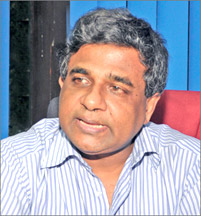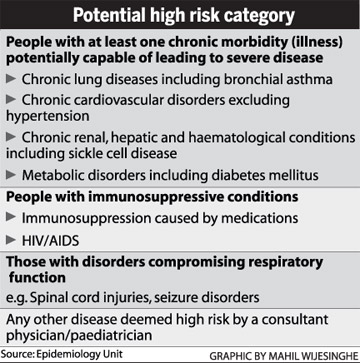|
A/H1N1 cases on the rise:
Call to re-activate vaccination
By Manjula FERNANDO
|

Dr. Sudath Peiris Pic: Tilak Perera
|
"The trend is disturbing given the fact that the numbers keep
multiplying since September," Chief Acting Epidemiologist Dr. Sudath
Peiris said when the Sunday Observer met him last week to get the latest
on the second wave of pandemic influenza A/H1N1 outbreak in the country.
Since the detection of two new cases of swine flu in September this year
after a lapse of seven months, indicating the onset of a second wave,
the numbers have shot up. Last week the Health Ministry renewed its call
for people and State medical institutes to re-activate the A/H1N1
vaccination scheme to get potentially risk groups including pregnant
mothers to get vaccinated immediately.
Over 20 confirmed deaths including that of two pregnant mothers
within the past three months have propelled the health authorities to
take precautionary and remedial action to stop the disease reaching
epidemic proportions during this 'second wave'.
Vaccination has already been made mandatory on all health care
workers, the most vulnerable group.
While some of the countries recorded the second and third wave of the
pandemic influenza this year, Sri Lanka's situation was somewhat quiet
due to consorted efforts by authorities and the media as well as the
positive response by the public. The first outbreak from mid June 2009
faded in February this year with 642 confirmed cases and 48 laboratory
confirmed deaths.
 The health authorities warn the second outbreak has now set in. The
first case of influenza A/H1N1 of the second outbreak was recorded at
the Lady Ridgeway hospital in September. The health authorities warn the second outbreak has now set in. The
first case of influenza A/H1N1 of the second outbreak was recorded at
the Lady Ridgeway hospital in September.
The victims were two infants who showed up with cough and cold
symptoms. And since then there have been more than 300 confirmed cases
of the deadly disease.
Deaths of the two pregnant mothers recently have spurred called for
the urgent need to start on the vaccination scheme for the 'potential
risk groups', mainly pregnant women and those suffering from chronic
illnesses.
Dr. Peiris said unfavourable rumours about the A/H1N1 vaccine has
started to circulate misleading the masses on the only guaranteed
preventable measure.
One particular news report which sent panic waves, said the doctors
refuse to use the influenza vaccine since the date of expiry is nearing.
"Up to the date of expiry it has the same potency, safety and
efficacy," Dr.Peiris assured adding that this vaccination lot, 1.5
million vials were brought down from a reputed State drug manufacturing
company in Australia.
"There is nothing called 'close to the date of expiry', until the
date of expiry the company assures its potency," he said.
Sri Lanka was fortunate to receive this expensive influenza vaccine
consignment (worth Rs. 1.5 billion) free from WHO as part of its' global
mitigation campaign.
The Chief Acting Epidemiologist said they have to restrict the
vaccine to only the categories identified as 'high risk' because of the
limited stock." This stock was received in July this year but since the
disease disappeared after February we were unable compel people to
vaccinate themselves."
The interest in the people also died down with no more reports of
A/H1N1 and now with this resurgence the health authorities are trying to
get people to go to the State medical institutes and get themselves
vaccinated.
"The vaccine is only available in State hospitals. This particular
influenza virus was first detected in Mexico in January 2009. It is a
fairly new virus strain.
There is only one company in the world that manufactures this vaccine
and the drug. They maintain a monopoly and new drugs are always
expensive. Thus each A/H1N1 vaccine costs nearly Rs. 15,000."
Dr. Peiris said like with some Pandemic influenza infections, there
is an 'iceberg phenomena' related to A/H1N1. There could be a lot of
A-symptomatic patients, those who will not show any symptoms synonymous
with the infection but still can be disease carriers. So the numbers
infected can be much higher than the reported figures. The disease is
categorized as deadly by the WHO. Once the diagnosis is made through lab
tests doctors can start the anti viral therapy. The drug is available
only in state hospitals and large private hospitals with in-patient
facilities.
"Since this is an unstable virus (which adopts and evolves according
to the environment like HIV) therapy should begin with the supervision
of a specialist doctor. The indiscriminate use of the drug can cause a
new version to spread. So the drug is not issued to private pharmacies
as an over the counter medication," he explained.
It is such an adoptive virus, it can infect the very same people who
got it previously unlike measles or chickenpox virus.
Doctors highly recommend both adults and children over 10 years to go
for the vaccine in the developed world as well.
"If you're pregnant, a flu shot is your best protection against
serious illness from the flu. A flu shot can protect pregnant women,
their unborn babies, and even their babies after birth," the Centres for
Disease Control and Prevention of the United States says on it's
website.
**********
Why is the 2009 H1N1 virus sometimes called 'swine flu'? This virus
was originally referred to as "swine flu" because laboratory testing
showed that many of the genes in the virus were very similar to
influenza viruses that normally occur in pigs (swine) in North America.
But further study has shown that the 2009 H1N1 is very different from
what normally circulates among North American pigs.
It has two genes from flu viruses that normally circulate in pigs in
Europe and Asia and bird (avian) genes and human genes. Scientists call
this a "quadruple reassortant" virus.
What are "emergency warning signs" that should signal anyone to seek
medical care urgently?
In children:
* Fast breathing or trouble breathing
* Bluish skin colour
* Not drinking enough fluids
* Not waking up or not interacting
* Being so irritable that the child does not want to be held
* Flu-like symptoms improve but then return with fever and worse
cough
* Fever with a rash In adults:
* Difficulty breathing or shortness of breath
* Pain or pressure in the chest or abdomen
* Sudden dizziness
* Confusion
* Severe or persistent vomiting
* Flu-like symptoms that improve but then return with fever and a
worse cough. Are there medicines to treat 2009 H1N1 infection? Yes.
There are drugs your doctor may prescribe for treating both seasonal and
2009 H1N1 called "antiviral drugs." These drugs can make you better
faster and may also prevent serious complications. It is very important
that antiviral drugs be used early to treat flu in people who are very
sick. |

